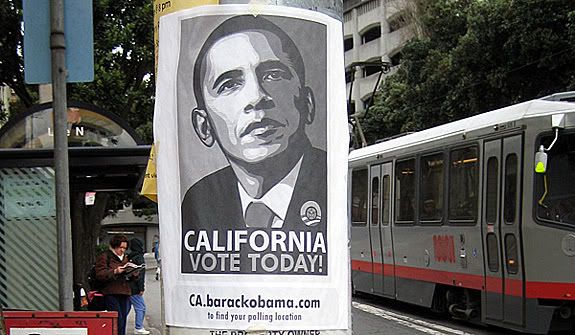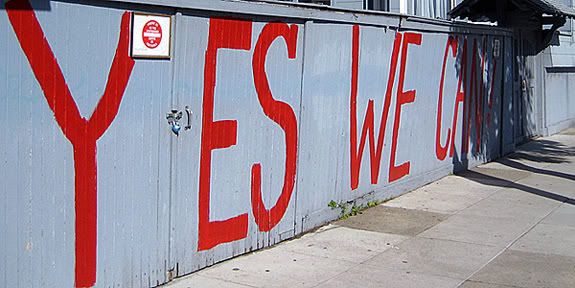Crêpes we can believe in
It's not enough to say I don't get Barack Obama. But I don't.
I do not believe mine is a jaundiced heart, immune to soaring rhetoric, flightless under the weight of cynicism. I do not believe I am so hidebound by my (considerable) ideological differences with Obama that I'd be deaf to the music in a good speech, unable to appreciate it for its sonority. But I don't swoon, and I wonder why.

Living in San Francisco, in one of the most liberal neighborhoods in the ur-liberal city, I'm surrounded by Obama signs, some distributed by the campaign, and others handmade and impromptu. The hand-drawn portraits of Obama always have a socialist realist quality. I don't look at his visage and expect that, within four years, we'll all be flipping cards in massive synchronized May Day celebrations. But I can't help but wonder if I'm looking at the Che Guevara t-shirt of the 2030's.
Our neighbors up the block have an Obama sign in their window and a BMW parked illegally on the sidewalk, most evenings. It's that kind of neighborhood. When San Francisco returned to district elections for its Board of Supervisors (think city council) eight years ago, ours was the neighborhood that sent Matt Gonzalez-an unindicted vandal who's currently Ralph Nader's running mate-to City Hall. Sorry about that. It wasn't my idea.

So every time I leave the house, I'm reminded that the enthusiasm for this first-term senator from Illinois is palpable. Especially as I pass this on the way to my favorite lunch spot. But why?
His speeches are full of promises to unify us, to bring us together to solve problems. How exactly? Those are the questions that serve only to divide us, silly. Even his much-vaunted speech on race only flirts with answers to hard questions; he acknowledges the contradictions inherent in affirmative action, but carefully dodges the question of what we're supposed to do about them. He promises unity and change, and if that isn't good enough for you, well, you just don't get it.
There is little in his history as a legislator to justify great expectations. When pressed for his legislative accomplishments, his supporters usually sputter, and the few that don't recite a pretty thin list. He took a trip to Russia with Richard Lugar to talk about non-proliferation. He helped veterans in Illinois get their disability checks. He co-sponsored this and that, an act that consists mainly of filing a form.
His performance in debates improved in the latter half of the campaign, but still leaves much to be desired. When Saturday Night Live called the press on their fawning, unskeptical coverage, the requisite period of self-flagellation didn't result in tougher questions. Moderates see in him a moderate and liberals see a liberal; the latter, at least, do so with more justification in his voting record. Free-traders insist he's really one of them; his record shrieks no. Alarming hints of a world view at odds with his cautiously hopeful rhetoric surfaced in the words of Jeremiah Wright, but the smoking gun eludes.
So are we left only with, as Obama himself posited, the "desire of wide-eyed liberals to purchase race reconciliation on the cheap"? Is Geraldine Ferraro right? Or is a nation exhausted by eight years of divide-and-conquer politics just reaching out for the candidate furthest in tone from George W. Bush?
Maybe it's all of those things. But I'm unmoved and unpersuaded. I see an adequate orator saying a lot about hope, and too little about anything else.
I do not believe mine is a jaundiced heart, immune to soaring rhetoric, flightless under the weight of cynicism. I do not believe I am so hidebound by my (considerable) ideological differences with Obama that I'd be deaf to the music in a good speech, unable to appreciate it for its sonority. But I don't swoon, and I wonder why.

Living in San Francisco, in one of the most liberal neighborhoods in the ur-liberal city, I'm surrounded by Obama signs, some distributed by the campaign, and others handmade and impromptu. The hand-drawn portraits of Obama always have a socialist realist quality. I don't look at his visage and expect that, within four years, we'll all be flipping cards in massive synchronized May Day celebrations. But I can't help but wonder if I'm looking at the Che Guevara t-shirt of the 2030's.
Our neighbors up the block have an Obama sign in their window and a BMW parked illegally on the sidewalk, most evenings. It's that kind of neighborhood. When San Francisco returned to district elections for its Board of Supervisors (think city council) eight years ago, ours was the neighborhood that sent Matt Gonzalez-an unindicted vandal who's currently Ralph Nader's running mate-to City Hall. Sorry about that. It wasn't my idea.

So every time I leave the house, I'm reminded that the enthusiasm for this first-term senator from Illinois is palpable. Especially as I pass this on the way to my favorite lunch spot. But why?
His speeches are full of promises to unify us, to bring us together to solve problems. How exactly? Those are the questions that serve only to divide us, silly. Even his much-vaunted speech on race only flirts with answers to hard questions; he acknowledges the contradictions inherent in affirmative action, but carefully dodges the question of what we're supposed to do about them. He promises unity and change, and if that isn't good enough for you, well, you just don't get it.
There is little in his history as a legislator to justify great expectations. When pressed for his legislative accomplishments, his supporters usually sputter, and the few that don't recite a pretty thin list. He took a trip to Russia with Richard Lugar to talk about non-proliferation. He helped veterans in Illinois get their disability checks. He co-sponsored this and that, an act that consists mainly of filing a form.
His performance in debates improved in the latter half of the campaign, but still leaves much to be desired. When Saturday Night Live called the press on their fawning, unskeptical coverage, the requisite period of self-flagellation didn't result in tougher questions. Moderates see in him a moderate and liberals see a liberal; the latter, at least, do so with more justification in his voting record. Free-traders insist he's really one of them; his record shrieks no. Alarming hints of a world view at odds with his cautiously hopeful rhetoric surfaced in the words of Jeremiah Wright, but the smoking gun eludes.
So are we left only with, as Obama himself posited, the "desire of wide-eyed liberals to purchase race reconciliation on the cheap"? Is Geraldine Ferraro right? Or is a nation exhausted by eight years of divide-and-conquer politics just reaching out for the candidate furthest in tone from George W. Bush?
Maybe it's all of those things. But I'm unmoved and unpersuaded. I see an adequate orator saying a lot about hope, and too little about anything else.